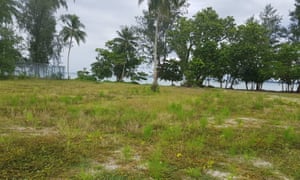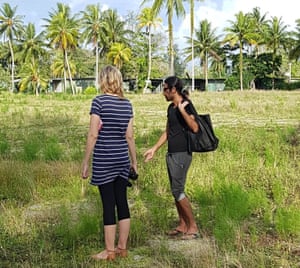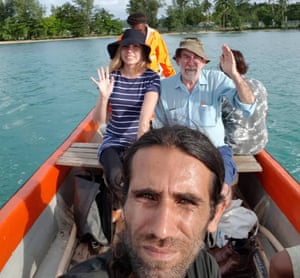Extract from The Guardian
They have destroyed the physical prison, but those who have been sacrificed by this system are still living
Recently
I met someone who I have not seen for a very long time. I was first
introduced to this individual in a faraway and distant past, during the
first few months after being exiled to Manus prison.
Nicole Judge is an Australian woman who worked as a case manager in Manus prison five years ago. However, after Reza Barati was killed in February 2014 she quit her job and spoke out against Australia’s brutal policy of exiling innocent refugees to Manus and Nauru; she became a human rights advocate. She has been active in this cause ever since.
After five years she returned to Manus to meet the people still
suffering, together with Ian Rintoul as a member of the Refugee Action
Coalition. Nicole mainly worked as a case manager in Mike camp, and I
remember how she would enter the camp together with other case managers
to talk to their designated clients. Now she was back here.Nicole Judge is an Australian woman who worked as a case manager in Manus prison five years ago. However, after Reza Barati was killed in February 2014 she quit her job and spoke out against Australia’s brutal policy of exiling innocent refugees to Manus and Nauru; she became a human rights advocate. She has been active in this cause ever since.
It was a hot afternoon when I boarded a boat with Nicole, Ian, a refugee named Adam Aziz and some local Manusians to visit the former prison where we were incarcerated for four and a half years before we were forcibly evicted and transferred to new prison camps in November.
It took 30 minutes to reach the former prison. After passing a few small islands we arrived at the shore – the same spot that for years we used to stare at from behind the fences. When we disembarked from the boat and walked past the beach, we were stunned by what we saw.

"We looked back at the site that was once a place for torture and captivity for hundreds of individuals"
The location of the medical centre where people stood waiting for hours in queues to obtain pills was now flattened. And they had destroyed the tents covering the dining areas where day after day the ruckus and commotion of suffering human beings reverberated.
Nicole was shocked; she tried to recall the places she had left behind years ago. She circled the abandoned site which was now replaced with vivid, luscious plants and vegetation. We all went in different directions and tried to recollect something of those bitter memories and find some semblance of the past. But there was nothing there.
I could only identify the trees, and I also found a toothbrush and a pair of flip flops buried in the dirt.
I asked Nicole how she felt. She replied: “I was really nervous initially to go back to the Lombrum campsite. I was not sure how I would feel. When I saw the campsite again I felt overcome with different memories, all flooding back at once.”

She shared one of her memories with me. When she witnessed instances of suicide and self-harm she would immediately go to the Salvation Army office to notify them. During those times they were warned about talking to the media; they were told not to talk to any journalist or media organisation about the situation in the Manus prison camp. Nicole reflected on her feelings at the time: “I remembered the warning we received about speaking out and what would happen to staff if we did. The strongest memory I had was a feeling of desperation, helplessness to do something about what I had seen while I was working there. I had the hopeless realisation that there was nothing I could do to help.”
This is precisely what I experienced as a prisoner during these years. The system has been designed in such a way that anyone working there cannot help anyone else in any way at all. The system completely controls every employee, and it is for this very reason that people like Nicole who are committed to moral principles cannot continue working in these prison camps. They either quit their jobs or the system realises their ethical practices and fires them. No one with a moral disposition can withstand working in this system for a long time. They either have to quit or tolerate the ruthlessness of the system. Nicole said: “We were told by our management not to give hope to the men detained on Manus. How could I successfully talk someone out of suicide and not give them hope? I wasn’t allowed to discuss politics, policy, opinion, or hope at all.”
This is what we prisoners have always known in visceral and profound ways; that is, the system has been designed to annihilate the refugees psychologically and emotionally and to ensure they do not feel like human beings. The result of this is that the refugees return to the country from which they fled.
Referencing the nature that had re-established itself on the site of the prison camp, Nicole displayed a bitter smile and said: “When you hide people away on islands and tell workers not to talk about what happens you create the perfect environment for abuse. Everyone who worked there has to question whether they participated in abuse or whether they did anything about it.”
For me and other refugees Nicole is a symbol of humanitarianism and dignity. She represents people for whom principles of humanity have genuine personal and social worth.
During that day one question continuously crossed my mind: How can the designers and organisers of Manus prison think that by razing the prison they can eliminate the remnants of the crimes they committed? Do they think that people will not find out about all this in the future?
When we boarded the boat again to return to Lorengau after an hour, we looked back at the site that was once a place for torture and captivity for hundreds of individuals. The boat slowly and calmly drifted away from the shore of human bondage. Manus prison disappeared within a deep jungle. But Nicole summed it up: “They have destroyed the physical Manus prison, but those who have been sacrificed by this system are still living. As long as we are alive the history of this prison continues. No matter how Australia has tried to silence the voices of the individuals still in purgatory in the new camps, the atrocities have only been transferred 35 kilometres away to three scattered prisons.”
• Behrouz Boochani is a journalist and an Iranian refugee held on Manus Island. Translated by Omid Tofighian from the American University in Cairo/University of Sydney
• Comments on this article have been pre-moderated to ensure the discussion is on the topics that have been written about in the article

No comments:
Post a Comment